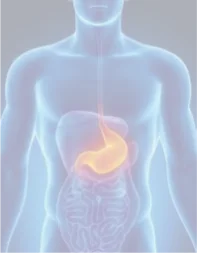
Definition:– Round or oval sore in the oesophagus or where lining of stomach/duodenum has been eroded by stomach acid and gastric juices
Symptoms:
Oesophageal ulcers –
- Pain when swallowing or when lying down
Duodenal ulcers –
- intermittent pain (steady and mild or moderately severe), usually just below the sternum
- gnawing, burning aching, soreness in abdomen,
- an empty feeling,
- hunger
Gastric, marginal and stress ulcers –
- pain that does not follow any pattern; may be relieved or brought on by eating
- may result in oedema, causing small intestinal blockage, resulting in –
- bloating,
- nausea or vomiting after eating
Complications (bleeding/rupture) –
- low blood pressure,
- dizziness,
- fainting
Causes:
- Chronic exposure of stomach/duodenum lining to irritants such as excess stomach acid or gastric enzymes
- Infection with Helicobacter pylori bacteria, drugs
- Cancer (rare)
Treatment:
Lifestyle Recommendations
- Eat plenty of dark green leafy vegetables – contain vitamin K, needed for healing; likely to be deficient in people with digestive problems
- Avoid coffee and alcohol
- Drink fresh cabbage juice daily
- If severe symptoms, eat soft foods such as avocado, bananas, potatoes, squash and yams; blend
- Eat frequent small meals; include well-cooked millet and rice, raw goats milk, soured milk products such as yoghurt, cottage cheese and kefir
- Drink barley, wheat and alfalfa juice – contain chlorophyll and are thus potent anti-cancer treatments
- If bleeding ulcer, eat organic baby foods or steamed vegetables, blended or mashed; add nourishing fibre such as guar gum and/or pysillium seed – easy to digest and nourishing and chemical-free
- Avoid fried foods, tea, coffee, chocolate, animal fats and carbonated drinks, as well as salt and sugar – linked to acid production, and reduce intake of refined carbohydrates
- Avoid cow’s milk – neutralizes existing stomach acid, but calcium and protein it contains stimulated production of more acid; almond, rice or soy milk are good substitutes
- Chew food thoroughly and take bitters – aids digestion
- Do not drink hot liquids
- Do not smoke – delays or prevents healing
- Keep the colon clean (daily bowel movements; enemas)
- Avoid painkillers such as aspirin and ibuprofen
- Avoid stress
Supplement Recommendations
- Acid-Ease – balances acidity
- L-Glutamine (500 mg daily) – heals peptic ulcers
- Pectin – helps relieve duodenal ulcers by creating a smoothe coating in the intestines
- Sodium Ascorbate (10 g/day) – soothing
- Vitamin E (200 IU daily) – potent antioxidant that helps to reduce stomach acid and pain, and promote healing (use d-alpha-tocopherol form)
- Vitamin A – for mucous membranes, circulation and scar tissue
- Digestive enzymes – may be of assistance if there is flatulence
- DO NOT USE Hydrochloric acid
Herbs –
- Alfalfa – good source of vitamin K
- Aloe vera juice/gel (4 ounces daily) – aids in pain relief and speeds healing
- Bupleurum, in combination with angelica and licorice root – good for treating ulcers
- Cat’s claw – cleanses and heals digestive tract (not if pregnant)
- Comfrey – treats ulcers (not for > 1 month)
- Garlic – may eradicate ulcers; antimicrobial
- Malva tea – calms stomach and reduces intestinal irritation
- Marshmallow root and slippery elm – soothe irritated mucous membranes
- Rhubarb (juice or tablet) – treats intestinal bleeding
